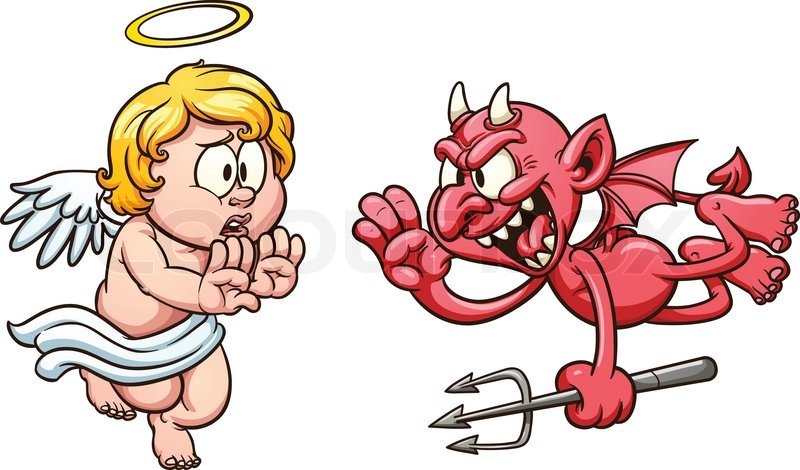
I remember a childhood cartoon in which the main character – it could have been Daffy Duck or Bugs Bunny – found himself in the middle of a struggle between a little devil and a little angel version of himself, each of which sat on one of his shoulders. The little devil tempted him to indulge in the pleasures of being bad, and the little angel reminded him of the virtues of being good. I don’t remember who won, but in Cartoon Land such things matter little. What’s important is that early on in life the two sides of good and bad, and their respective arguments about behavior, became a lesson about moral choices. For better or worse, for me and countless other baby boomers, Sunday morning TV cartoons were my Bible.
The merits of being educated and taught in this way can be, and has been, vigorously argued, but by whatever method the lessons of good and bad/right and wrong are taught, for most of us coming-to-terms with our little devils and little angels remains a life-long experience. In ways large and small, we face moral choices constantly.
The complex nature of conventional society makes this so, essentially forcing us to face our complicity in nearly choice-less social and cultural happenings in which issues of good and bad exist but are mostly impossible to resolve. Every time I hop into my car for a drive to the market, for example, my role in producing greenhouse gasses which contribute to global warming pops up. My little devil argues for convenience and comfort while my little angel reminds me of pollution and laziness. This same process, to be honest, happens constantly. Should I eat this or that, sit on the couch or clean the kitchen, clear the leaves from the gutters or read a book, express my feelings or stay silent. With all the hopping about of my little devil and angel, It’s no wonder my shoulders feel so tired.
This process plays out in venues large and small. I see it happening in men all the time, but I’m sure women experience similar struggles. Internally, these self-arguments are kept secret – desires and entreaties about weight, appearance, clothing, talents, weaknesses and so forth – the results of which often appear as the surprising content of dreams. Externally, we either act on “auto-pilot,” seemingly oblivious to the effects of our decisions, or we direct our attention to them. If the latter, we frequently find ourselves facing a Catch-22, unable to resolve the fact that our actions are often simultaneously both good and bad, effectively undermining the ability to act fully in accord with our conscience. Is it any wonder anti-depressants and pain-killers are the most widely prescribed drugs?
On the national stage the little devils and little angels are all the more obvious. Politicians like Richard Nixon, Bill Clinton, Gary Hart and Mark Sanford come to mind alongside crooks like Bernie Madoff, movie stars like Rob Lowe, diplomats like Henry Kissinger and the uncountable numbers of men who’ve made terrible decisions – like the Secret Service agents who spent their time in hotel rooms with prostitutes during a Presidential trip to Columbia.
The lesson in all this? The Bible may be an extended teaching about moral philosophy, but we actually live in Cartoon Land.